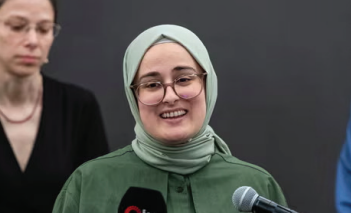
On May 9th, Tufts doctoral student Rümeysa Öztürk walked free for the first time in 45 days after being detained outside of her Somerville apartment for criticizing Tufts’ policy on Israel.
Upon returning to Boston, Öztürk held a press conference with her lawyers, alongside U.S. Senator Ed Markey and U.S. Representative Ayanna Pressley. Öztürk told a crowd of reporters, “America is the greatest democracy in the world, and I believe in those values that we share. I have faith in the American system of justice.” She described the love she has received from her union, professors, and classmates, highlighting how friends read her textbooks over the phone so she could keep up with her studies. Her final message to the crowd was, “Please don’t forget about all the wonderful women in the immigration detention system. I was so tired of witnessing cries and pain that can be all preventable.” Senator Markey also spoke, calling her release “a victory for Rümeysa, a victory for justice, [and] a victory for democracy.”
Öztürk, a 30-year-old Turkish citizen on a valid student visa, was abducted by ICE agents on March 25th, when she was stopped on the street and forced into an unmarked SUV by six plain-clothed officers. For 24 hours after her arrest, Öztürk’s location was unknown to everyone, including her lawyers. Eventually, it was confirmed that she had been moved from Massachusetts to Vermont, and finally to a detention center in Louisiana, 1,500 miles away from Somerville, where she was kept for six weeks. During this time, Öztürk says she was one of 24 people in a cell with a capacity of 14.
The Department of Homeland Security (DHS) arrested Öztürk after identifying her as a threat to national security, citing a 2024 Tufts Daily op-ed she wrote criticizing the university’s president for refusing to divest from Israel. A DHS spokesperson told NBC News that they found Öztürk “engaged in activities in support of Hamas.” The op-ed, however, does not mention Hamas, and no criminal charges have been filed against Öztürk.
A video of Öztürk’s abduction—which came days after Columbia graduate student Mahmoud Kahlil was similarly abducted—was circulated widely on social media, sparking outrage and protests, both at Tufts and across the country. “I’m very glad Rumeysa’s been released,” Tufts professor Nick Seaver told the Register Forum, “but the fact that there are still other students in detention, and that there’s this precedent for picking up international students on flimsy charges, is very chilling.” He added, “I think Tufts has done a relatively good job of supporting our students in this situation, but there’s really a limited amount the institution can do against an unchecked and vindictive federal administration.”
On May 9th, a judge declared Öztürk immediately free on bail, citing “very significant” violations of her constitutional rights. The implications of this are vast, as Noor Zafar, attorney with the ACLU wrote in a press release about Öztürk’s release, “Today’s ruling underscores a vital First Amendment principle: No one should be imprisoned by the government for expressing their beliefs.” Her immigration proceedings will now continue separately in Louisiana and Vermont.
This article also appears in our June 2025 print edition.







